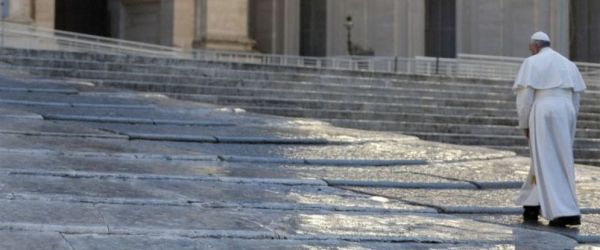Saints Peter and Paul, whom we celebrate today, are sometimes depicted in icons as they support the edifice of the Church. This reminds us of the words in today’s Gospel in which Jesus says to Peter: “you are Peter, and on this rock I will build my church” (Mt 16:18). It is the first time that Jesus utters the word ‘Church’ but more than the noun, I would like to invite you today to think about the adjective, which is possessive, ‘my’: my Church. Jesus does not speak of the Church as an external reality, but he expresses the great love he has for her: my Church. He is devoted to the Church, to us. Saint Paul writes: “Christ loved the church and gave himself up for her” (Eph 5:25), that is, the Apostle explains, Jesus loves the Church as his bride. For the Lord we are not a group of believers or a religious organization. We are his bride. He looks upon his Church with tenderness. He loves her with absolute fidelity despite our mistakes and our betrayals. As he said that day to Peter, he says to all of us today: “my Church, you are my Church”.
And we too can repeat it: my Church. We do not say this with a sense of exclusive belonging but rather with an inclusive love. Not to distinguish ourselves from others but to appreciate the beauty of being with others because Jesus wants us to be united and open. Indeed the Church is not ‘mine’ because she responds to my ego, to my desires, but rather, because I pour my affection into her. She is mine because I care for her, because, like the Apostles in the icon, I too support her. How? With fraternal love. With our fraternal love we can say: my Church.
In another icon, Saints Peter and Paul are depicted as they are locked in an embrace. They were very different from each other: a fisherman and a Pharisee with rather different life experiences, characters, ways of doing things and sensitivities. Contrasting opinions and frank debates between them were not lacking (cf. Gal 2:11). But what united them was infinitely greater: Jesus was the Lord of both, together they would say “my Lord” to the One who says “my Church”. Brothers in the faith, they invite us to rediscover the joy of being brothers and sisters in the Church. On this feast day that unites two Apostles who were so different from each other, it would be beautiful for each of us to also say: “Thank you, Lord, for that person who is different from me: he or she is a gift for my Church”. We are different but this enriches us; it is brotherhood. It is good for us to appreciate the qualities of others, to recognize the gifts of others without malice or envy. Envy! Envy causes bitterness inside; it is vinegar to the heart. The envious have a bitter gaze. Many times when one meets an envious person, one feels like asking: what did he have for breakfast today, a caffelatte or vinegar? Because envy is sour. It makes life sour. Instead, how beautiful it is to know that we belong to each other because we share the same faith, the same love, the same hope, the same Lord. We belong to each other: and this is splendid, to say: our Church! Fraternity.
At the end of the Gospel Jesus says to Peter: “Tend my sheep” (Jn 21:17). He speaks of us and says “my sheep” with the same tenderness with which he says my Church. Jesus loves us with such love, such tenderness! He feels we are his own. This is the affection that edifies the Church. Through the intercession of the Apostles, today let us invoke the grace to love our Church. Let us ask for eyes that are able to see our brothers and sisters in her, a heart that knows how to welcome others with the tender love that Jesus has for us. And let us ask for the strength to pray for those who do not think as we do — this one thinks differently; I pray for him — pray and love, which is the opposite of gossiping, perhaps behind one’s back. Never speak ill of someone, pray and love. May Our Lady who brought harmony among the Apostles and prayed with them, (cf. Acts 1:14) keep us as brothers and sisters in the Church.
[Pope Francis, Angelus 29 June 2019]












